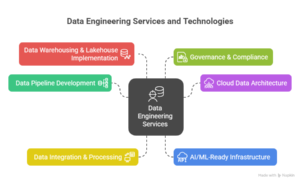In this digital world, supply chain management is undergoing a profound transformation driven by data engineering. As businesses strive to optimize operations, improve efficiency, and reduce costs, leveraging data has become the key to success. This article delves into groundbreaking innovations in supply chain integration, as explored by Satish Kumar Boddu, who has extensively researched the intersection of data engineering and supply chain management.
The Power of Data Consolidation
One of the major challenges in supply chain management is the fragmentation of data across multiple platforms. By consolidating supply chain data into a unified framework, businesses can achieve seamless operations and real-time decision-making. Integrating diverse data streams allows organizations to enhance supply chain visibility, reduce errors, and improve collaboration across various stakeholders.
Enhancing Interoperability for Seamless Operations
Interoperability is a key enabler of supply chain efficiency, ensuring that various systems communicate effectively. Businesses implementing standardized integration protocols experience reduced operational costs and enhanced adaptability to market changes. This ability to integrate multiple communication protocols improves supplier collaboration, optimizes workflows, and reduces the complexity of global supply networks.
Real-Time Visibility for Proactive Decision-Making
Real-time monitoring of supply chain activities has become essential for businesses aiming to mitigate risks and improve efficiency. Companies that deploy visibility solutions witness significant reductions in inventory carrying costs and enhanced delivery performance. With access to live operational data, businesses can identify potential disruptions early, enabling faster responses and improved risk management strategies.
Predictive Analytics: A Game-Changer for Forecasting
Advanced analytics have made the shift from reactive to predictive supply chain management possible. By leveraging artificial intelligence and machine learning, businesses can enhance forecast accuracy, reduce excess inventory, and improve demand planning. Predictive analytics allows organizations to anticipate market fluctuations, optimize resources, and create agile supply chain strategies that adapt to changing conditions.
The Role of Data Engineering Frameworks
Supply chain integration relies on robust data engineering frameworks that manage large-scale data ingestion, storage, transformation, and visualization. Organizations implementing scalable and well-structured data frameworks achieve better decision-making capabilities and operational resilience. These frameworks ensure seamless data flow across supply chain operations, enabling organizations to harness the full potential of big data.
Revolutionizing Inventory Management with Data
Optimizing inventory levels is a major challenge in supply chain management. Businesses can reduce stockholding costs and enhance stock availability by implementing data-driven inventory management systems. Machine learning algorithms improve demand forecasting, minimizing errors and enabling just-in-time inventory management, reducing waste and improving efficiency.
Logistics and Transportation Optimization
Data engineering has transformed logistics and transportation by improving route optimization, fleet utilization, and delivery accuracy. Businesses integrating IoT-based tracking and predictive analytics into their logistics operations experience reduced transportation costs and enhanced delivery timelines. Optimized logistics networks also reduce fuel consumption, lower environmental impact, and improve overall efficiency.
Strengthening Supplier Collaboration
Supplier relationships are crucial for supply chain success. Businesses can enhance supplier communication, reduce lead times, and improve order fulfillment rates through shared data platforms. Real-time data sharing fosters better alignment between suppliers and manufacturers, ensuring efficient production scheduling and streamlined supply chain operations.
Managing Risks Through Data-Driven Insights
Supply chain disruptions threaten business stability, but data-driven risk management provides a proactive approach to mitigation. By leveraging advanced analytics, organizations can detect potential risks early, enabling swift action to minimize impact. Predictive insights enhance resilience, reduce financial losses, and ensure operational continuity, allowing businesses to adapt quickly to evolving supply chain challenges.
The Future of Supply Chain Integration
Emerging technologies like blockchain, AI, edge computing, and digital twins are transforming supply chain integration. Blockchain boosts transparency and compliance, while AI automates decisions for better resource allocation and customer satisfaction. Edge computing enhances real-time processing, reducing latency. Digital twins enable virtual simulations, improving risk assessment and strategic planning, driving efficiency and resilience in modern supply chains.
In conclusion, Satish Kumar Boddu’s research highlights the transformative impact of data engineering on modern supply chains. Organizations that embrace data-driven strategies can significantly improve efficiency, cost reduction, and customer satisfaction. As technology evolves, businesses integrating these innovations into their supply chain management practices will gain a competitive edge in an increasingly dynamic global market.





























